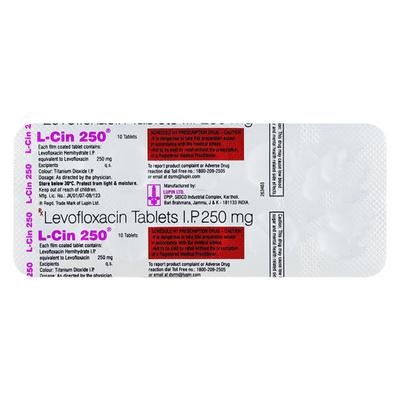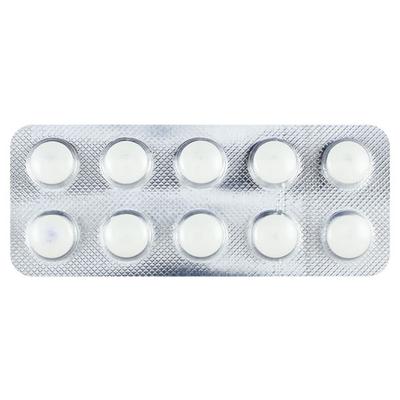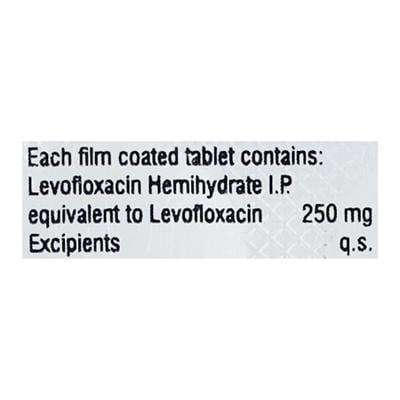

Netmeds First Membership
Quick Links
Introduction About L CIN 250MG TABLET
L CIN 250MG TABLET contains Levofloxacin, which belongs to the group of medicines called Antibiotics. L CIN 250MG TABLET is used to manage infections of acute sinusitis, lungs (such as long-term breathing problems/pneumonia), urinary tract (including kidney and bladder), prostate gland, and skin & soft tissue (including muscles) in affected individuals.
It is also used to reduce the chances of getting anthrax (pulmonary disease) or worsening of the disease after getting exposed to anthrax-causing bacteria.
L CIN 250MG TABLET is not recommended for use in patients allergic to levofloxacin and/or other quinolone antibiotics (such as moxifloxacin, ciprofloxacin, and ofloxacin). It is also not recommended for use in patients suffering from epilepsy (seizure) and/or tendinitis (inflammation/irritation of the tendon).
Before taking L CIN 250MG TABLET, inform your doctor if you have/had brain damage (due to stroke/other brain injury), diabetes, myasthenia gravis (long-term neuromuscular junction disease), aneurysm (a condition that occurs due to bulge or enlargement of a large blood vessel), organ transplantation, heart problems (such as very slow heart rhythm, weak heart, myocardial infarction), kidney problems, and/or liver problems.
L CIN 250MG TABLET is not recommended for use during pregnancy or in women planning for pregnancy. It is also not recommended for use in breastfeeding women.
L CIN 250MG TABLET is not recommended for use in children and adolescents (aged below 18 years). The medicine can be used with caution in elderly patients (aged above 60 years) after consulting the doctor.
The most common side effects after taking L CIN 250MG TABLET are sleeping problems, headache, dizziness, nausea, vomiting, and/or diarrhea. Consult your doctor if any of these symptoms worsen.
Uses Of L CIN 250MG TABLET
- Manage infections of acute sinusitis, lungs (such as long-term breathing problems/pneumonia), urinary tract (including kidney and bladder), prostate gland, and skin & soft tissue (including muscles) in affected individuals
- Reduces the risk of getting anthrax (pulmonary disease) or worsening of the disease after getting exposed to anthrax-causing bacteria
How L CIN 250MG TABLET Works
L CIN 250MG TABLET works by inhibiting DNA gyrase (an enzyme responsible for DNA synthesis) in bacteria, which results in the destruction of bacterial cell structure, thus managing the occurrence of bacterial infection in affected individuals.
How to use L CIN 250MG TABLET
Take L CIN 250MG TABLET as advised by your physician. Swallow the medicine with a glass of water. Do not crush or chew the medicine. Your doctor will decide the correct dose and duration for you depending upon your age, body weight, and disease condition.
Side Effects Of L CIN 250MG TABLET
Common
- sleeping problems
- headache, dizziness
- nausea, vomiting, diarrhea
Uncommon
- candidiasis (a fungal infection)
- anxiety, confusion, nervousness, sleepiness, trembling, and spinning sensation
- shortness of breath
- altered taste, loss of appetite, stomach upset, indigestion, stomach ache, flatulence, constipation
- itching, skin rash, red itchy welts, hyperhidrosis (increased sweating)
- joint and muscle pain
- general weakness
Rare
- signs of low blood sugar such as shakiness, sweating, headache, hunger, and/or nausea
- depression, mental problems, agitation, abnormal dreams/nightmares
- tingling sensation in hands and feet
- hearing impairment (tinnitus), blurred vision
- fever, racing heartbeat, low blood pressure, muscle weakness
- interstitial nephritis (allergic kidney reaction associated with altered kidney function and occasional kidney failure)
- sharply demarcated, erythematous patches with/without blisters
Stop taking L CIN 250MG TABLET and consult your doctor immediately in case you experience:
- signs of allergic reaction such as rash, swallowing/breathing problems, swelling of lips/face/throat/tongue
- fits
- signs of DRESS (Drug Reaction with Eosinophilia and Systemic Symptoms) such as widespread rash, high fever, liver enzyme elevations, white blood cell abnormalities, and/or enlarged lymph nodes
- signs of SIADH (syndrome associated with impaired water excretion and low levels of sodium) such as nausea, vomiting, cramps, and/or irritability
- bruising and bleeding due to thrombocytopenia (a condition that occurs due to a lowering of blood platelet count)
- neutropenia (low white blood cell count)
- signs of hypersensitivity reaction (exaggerated immune response) such as skin rash, red itchy welts, fever, shortness of breath
- change in psychotic reactions such as hallucinations, paranoia
- serious skin reactions such as Stevens-Johnson syndrome and toxic epidermal necrolysis (associated with signs such as reddish macules/circular patches with central blisters on the trunk, skin peeling, ulcers of the mouth/throat/nose/genitals/eyes preceded by fever and flu-like symptoms)
- signs of liver problems such as loss of appetite, skin and eyes becoming yellow in colour, dark-coloured urine, itching, and/or abdomen
- signs of neuropathy (nerve damage) such as burning, tingling, pain, and/or numbness
- signs of severe bowel problems such as watery diarrhea, stomach cramps, fever
- pain and inflammation in tendons/ligaments
- signs of agranulocytosis (a condition that occurs due to the lowering of white blood cells) such as fever, sore throat, and/or a general feeling of being unwell
- loss of circulation due to anaphylactic shock (severe allergic reaction)
- temporary loss of consciousness/posture (syncope)
- temporary loss of vision
- signs of prolongation of QT interval such as abnormal fast heart rhythm, cardiac arrest, alteration of the heart rhythm
- signs of aortic aneurysm (a large bulge in the aortic artery) and dissection (a tear in the inner layer of the aortic artery), such as sudden, severe pain in your abdomen, chest, or back
- rapid onset of shortness of breath (especially when you lie down flat in your bed), swelling of ankles, feet, and abdomen, and/or new onset of heart palpitations
- inflammation of pancreas
- inflammation of liver
- pain/inflammation of tendon in ankle, wrist, elbow, shoulder, and/or knee
- rhabdomyolysis (condition marked by muscle rupture and muscle destruction)
- suicidal thoughts/actions
- porphyria (a very rare metabolic disease)
- impaired eyesight or other eye disturbances
How To Manage Side Effects
Diarrhea
Drink plenty of water and stay hydrated. Try to avoid taking any medicine on your own to manage diarrhea. Consult your doctor and inform them if the symptom gets worse.
Dizziness Or Drowsiness
Try to rest and get enough sleep. Try to avoid driving or operating any tools or machines while you feel dizzy. Limit consumption of alcohol, as it can aggravate dizziness. Consult and inform your doctor if the symptom worsens.
Headache
If L CIN 250MG TABLET causes headache, then take rest and drink plenty of fluids. Try to avoid drinking alcohol. Ask your doctor to recommend a painkiller. Headaches should usually go away after the first week of taking L CIN 250MG TABLET. If it lasts more than a week or is severe, inform your doctor.
Nausea And Vomiting
Take L CIN 250MG TABLET with or just after a meal. Stick to simple meals. Avoid eating oil-rich or spicy foods, sugary snacks, and drinks. Avoid drinking too much liquid along with your meals, drink slowly in between meals. Talk with your doctor if the condition worsens
Skin rash Or Itching
Try to pat or tap your skin instead of scratching it. Hold a damp towel to cool your skin. Wear loose clothing and avoid tight clothes or clothes made from wool or synthetic fabrics. Avoid using perfumed soaps, deodorants, or moisturizers, and use a skin softener regularly.
Warning & Precautions
Pregnancy
ContraindicatedL CIN 250MG TABLET is not recommended for use during pregnancy or in women planning for pregnancy. Consult your doctor before taking L CIN 250MG TABLET.
Breastfeeding
ContraindicatedL CIN 250MG TABLET is not recommended for use in breastfeeding women. Consult your doctor before taking L CIN 250MG TABLET.
Driving and Using Machines
Use with CautionDo not drive or operate machines if you feel dizzy, sleepy, spinning sensation, and/or changes in eyesight after taking L CIN 250MG TABLET.
Kidney
Use with CautionL CIN 250MG TABLET should be taken with caution in patients with kidney problems. Consult your doctor before taking L CIN 250MG TABLET.
Liver
Use with CautionL CIN 250MG TABLET should be taken with caution in patients with liver problems. Consult your doctor before taking L CIN 250MG TABLET.
Allergy
ContraindicatedDo not take L CIN 250MG TABLET if you are allergic to levofloxacin, other quinolone antibiotics (such as moxifloxacin, ciprofloxacin, ofloxacin), and/or any other ingredients of this medicine.
Heart Disease
Use with CautionL CIN 250MG TABLET should be taken with caution in patients with heart problems such as prolonged QT interval, very slow heart rhythm, weak heart, myocardial infarction, heart valve regurgitation, aortic aneurysm/dissection, endocarditis, and congenital heart valve disease. Consult your doctor before taking L CIN 250MG TABLET.
Use In Pediatrics
ContraindicatedL CIN 250MG TABLET is not recommended for use in children and adolescents (aged below 18 years). Consult your doctor before taking the medicine.
Use In Geriatrics
Use with CautionL CIN 250MG TABLET should be taken with caution in elderly patients (aged above 60 years). Consult your doctor before taking the medicine.
Others
L CIN 250MG TABLET is not recommended for use if you:
- have/ever had epilepsy (seizure)
- have/ever had tendinitis (inflammation/irritation of tendon) after management with quinolone antibiotics
Before taking L CIN 250MG TABLET, inform your doctor if you:
- have had damage to your brain due to a stroke or other brain injury
- are suffering from glucose-6-phosphate dehydrogenase deficiency (a genetic disorder of red blood cells)
- have ever had mental health problems
- are diabetic
- suffer from myasthenia gravis (long-term neuromuscular junction disease)
- have a history of aneurysm (bulge or enlargement of a large blood vessel)
- suffer from connective tissue disorders such as Marfan syndrome, vascular Ehlers-Danlos syndrome, Turner syndrome, and Sjogren’s syndrome
- have a salt imbalance in the blood
- suffer from vascular disorders such as Takayasu arteritis, giant cell arteritis, Behçet´s disease, high blood pressure, or known atherosclerosis, rheumatoid arthritis
- have ever developed a severe skin rash/peeling, blistering, and/or mouth sores after taking the medicine
- have received an organ transplant
Interactions
A. Drug-Drug interactions:
Before taking L CIN 250MG TABLET, inform your doctor if you are taking any of the following medicine:
- corticosteroids (medicines used to reduce inflammation and suppress the immune system) Ex. cortisone, hydrocortisone
- other quinolone antibiotics (medicines used to manage bacterial infections) Ex. moxifloxacin, ciprofloxacin, or ofloxacin
- vitamin K antagonists (medicines used to thin blood) Ex. warfarin
- theophylline (used for breathing problems)
- non-steroidal anti-inflammatory drugs (medicines used for pain and inflammation) Ex. aspirin, ibuprofen, fenbufen, ketoprofen, indomethacin
- ciclosporin (used to manage rejection of transplanted organs)
- antiarrhythmics (medicine used for abnormal heart rhythm) Ex. quinidine, hydroquinidine, disopyramide, sotalol, dofetilide, ibutilide, amiodarone
- tricyclic antidepressants (medicines used to manage depression) Ex. amitriptyline, imipramine
- antipsychotics (medicines used to manage bipolar disorder and schizophrenia) Ex. olanzapine, risperidone, clozapine
- erythromycin, clarithromycin, azithromycin (medicines used to manage bacterial infections)
- probenecid (a medicine used for management of gout)
- cimetidine (used for ulcers and heartburn)
- iron tablets (used for anaemia)
- zinc supplements, magnesium/aluminium-containing antacids (used for acid/heart burn)
- didanosine/sucralfate (used for stomach ulcers)
Overdosage:
If you or anyone else accidentally take too much of L CIN 250MG TABLET, consult your doctor immediately or visit the nearby hospital. Symptoms of overdose are seizures, confusion, dizziness, less consciousness, tremor, heart problems (associated with signs such as uneven heartbeats, nausea), and/or stomach burning.
Synopsis
| Druge | : | Levofloxacin |
| Pharmacological Category | : | Antibiotics |
| Therapeutic Indication | : | Bacterial infections, Reduce the risk of anthrax occurrence |
| Dosage Forms | : | Tablet, Syrup, Oral Suspension, Oral Solution, Injection, Infusion, Eye Drops, Ear drops |
More Information
Storage
- Keep L CIN 250MG TABLET out of reach of children
- Store L CIN 250MG TABLET at room temperature
FAQs About L CIN 250MG TABLET
Q: What is L CIN 250MG TABLET used for?
A: L CIN 250MG TABLET is used to manage infections of acute sinusitis, lungs (such as long-term breathing problems/pneumonia), urinary tract (including kidney and bladder), prostate gland, and skin and soft tissue (including muscles) in affected individuals. It is also used to reduce the risk of getting anthrax (pulmonary disease) or worsening of the disease after getting exposed to anthrax-causing bacteria.
Q: What are the side effects of L CIN 250MG TABLET?
A: The most common side effects after taking L CIN 250MG TABLET are sleeping problems, headache, dizziness, nausea, vomiting, and/or diarrhea. Consult your doctor if any of these symptoms worsen.
Q: What happens if you take more L CIN 250MG TABLET than your required dose?
A: If you or anyone else accidentally take too much of L CIN 250MG TABLET, consult your doctor immediately or visit the nearby hospital. Symptoms of overdose are seizures, confusion, dizziness, less consciousness, tremor, heart problems (associated with signs such as uneven heartbeats, nausea), and/or stomach burning.
Q: How L CIN 250MG TABLET works?
A: L CIN 250MG TABLET works by inhibiting DNA gyrase (an enzyme responsible for DNA synthesis) in bacteria, which results in the destruction of bacterial cell structure, thus managing the occurrence of bacterial infection in affected individuals.
Q: How to take L CIN 250MG TABLET?
A: Take L CIN 250MG TABLET as advised by your physician. Swallow the medicine with a glass of water. Do not crush or chew the medicine. Your doctor will decide the correct dose and duration for you depending upon your age, body weight, and disease condition.
Q: Who should not take L CIN 250MG TABLET?
A: L CIN 250MG TABLET is not recommended for use if you have/ever had epilepsy (seizure), tendinitis (inflammation/irritation of tendon) after management with quinolone antibiotics, or if you are allergic to levofloxacin, other quinolone antibiotics (such as moxifloxacin, ciprofloxacin, or ofloxacin).
Q: Is L CIN 250MG TABLET safe for kids?
A: L CIN 250MG TABLET is not recommended for use in children and adolescents (aged below 18 years). Consult your doctor before taking the medicine.
Q: Can L CIN 250MG TABLET be used during pregnancy?
A: L CIN 250MG TABLET is not recommended for use during pregnancy or in women planning for pregnancy. Consult your doctor before taking L CIN 250MG TABLET.
Q: How long should I take L CIN 250MG TABLET?
A: Take L CIN 250MG TABLET as advised by your physician. Your doctor will decide the correct dose and duration for you depending upon your age, body weight, and disease condition.
Q: Is L CIN 250MG TABLET safe for kidneys?
A: L CIN 250MG TABLET should be taken with caution in patients with kidney problems. Consult your doctor before taking L CIN 250MG TABLET.
References
1. KD Tripathi. Sulfonamides, Cotrimoxazole, and Quinolones. Essentials of Medical Pharmacology. Seventh Edition. 2013. Page – 713.
2. Vivek Podder, Nazia M. Sadiq. Levofloxacin. NIH National Library of Medicine. National Center for Biotechnology Information. StatPearls [Internet]. September 2022. [Accessed on 8th August 2024] https://www.ncbi.nlm.nih.gov/books/NBK545180/
3. Ipca Laboratories UK Limited. Electronic Medicines Compendium (EMC). [Revised in January 2021]. [Accessed on 8th August 2024] https://www.medicines.org.uk/emc/files/pil.12153.pdf
4. Leeford Healthcare Limited. LEVELFOX 750. [Accessed on 8th August 2024] https://www.leeford.in/product/1021/levelfox-750
Useful Diagnostic Tests
- Complete Blood Count (CBC)/ Hemogram
- Culture & Sensitivity, Blood
- Liver Function Test (LFT)
- Kidney Function Test (KFT)
- Serum Electrolytes/ Electrolytes Profile
- Full Body Health Checkup Advanced
- Healthy Midlife Checkup
- Full Body Checkup - Gold
- Full Body Checkup – Silver









